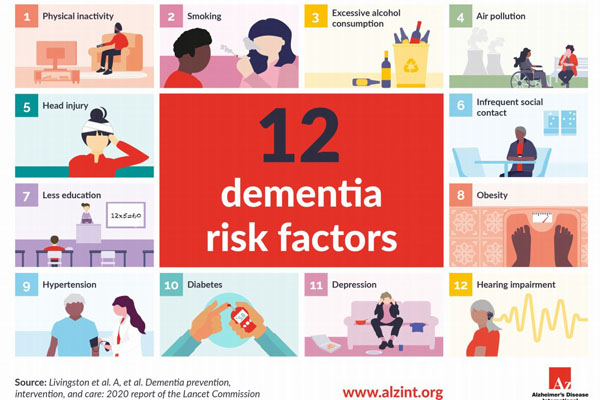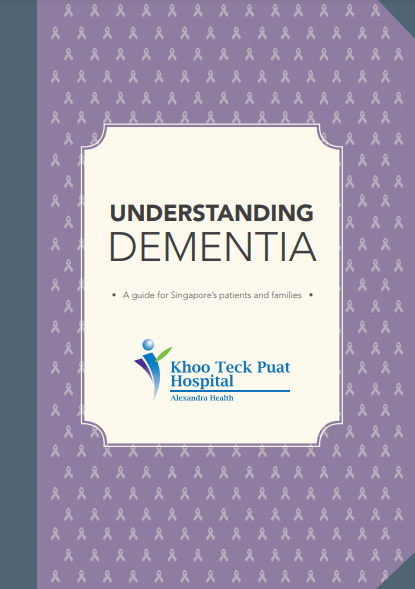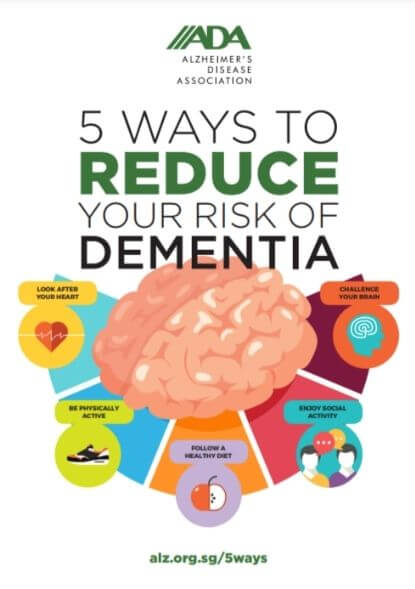Playback speed:
Although factors such as genes, gender, race, and age are not within control, there are things that can be done to reduce the risk of developing dementia.
Individuals can make lifestyle changes to reduce their risks of developing dementia, and systemic societal changes can be made to reduce the incidence of dementia in a community.
There is growing research evidence that supports the link between 12 factors, which are written about later in this article, and the risk of developing dementia. Though these risk factors are not direct causes of dementia, addressing all of them may potentially prevent or delay up to 40% of potential cases of the development of dementia cases.

12 Modifiable Risk Factors of Dementia
Physical Inactivity
A year-long study by researchers at the University of Pittsburgh, involving 120 people aged between 60 and 80, found that walking briskly for 30 to 40 minutes a day three times a week was sufficient for re-growing the structures of the brain linked with cognitive decline in later life. Scans later revealed that the parts of the brain that shrink with age actually grew in volume after moderate but regular exercise.1
Smoking
Smoking greatly increases the risk of developing dementia in addition to creating complications for the lungs and heart, while increasing the risk of other conditions, including type 2 diabetes, stroke, lung cancer, and other cancers.
The World Health Organization (WHO) and Alzheimer’s Disease International (ADI) found a correlation between smoking and the risk of dementia: smokers have a 45% higher risk of developing dementia than non-smokers.2 WHO’s recently released guidelines for dementia risk reduction in 2019 listed tobacco dependence as the leading cause of preventable death globally, and associated it with other disorders and age-related conditions such as frailty and work ability in order people.3
Excessive Alcohol Consumption
Air Pollution
Head Injury
Infrequent Social Contact
Of all the ways to reduce the risk of dementia, engaging in frequent social activity may be the most enjoyable. It is well established that social interaction may delay the onset of dementia.
Though the research literature on which specific types of social activity reduce dementia risk is still developing, some theories suggest that social engagement may benefit brain health via brain stimulation, staving off dementia and depression in the process.
A study published in the American Journal of Public Health showed that women with larger social networks were 26% less likely to develop dementia than those with smaller social networks. In addition, women who had daily contact with friends and family cut their risk of developing dementia by almost half.4
The potential benefits of social contact on cutting dementia risk adds more reason to common experience of how social activity enriches lives. Some ways of engaging in activity include: joining a club or neighbourhood social activity, meeting friends for a meal, or volunteering.
Mid-Life Obesity
Hypertension (High Blood Pressure)
Diabetes
Depression, Loneliness and Social Isolation
In any case, it is important to manage and treat depression because it is associated with increased disability, physical illness
Hearing Impairment
People with hearing loss have a significantly increased risk of dementia, though using hearing aids seems to reduce this risk. As hearing loss is one of the risk factors which affects the most people, it may be a particularly strategic factor to address in reducing the incidence of dementia.
LDL Cholesterol
People with high levels of LDL cholesterol in their blood (more than 3mmol/L) have an increased risk of dementia, and this is especially true for those below the age of 65. Cohort studies in the UK have suggested that there is stronger risk of young onset dementia than late-onset dementia associated with higher baseline LDL cholesterol. Regardless of one’s genetic disposition to dementia, you can reduce your risk of developing dementia by adhering to a healthy diet. An example would be eating at least three weekly servings respectively of fish, fruit and vegetables; avoiding sweetened beverages and avoiding processed meat like sausages.
Untreated Vision Loss
Globally, around 12.6% of adults above the age of 50 have avoidable vision loss. Vision loss is strongly linked with future cognitive impairment. It is estimated that those with untreated vision loss have 35% higher risk of dementia than those with normal vision. In particular, increased dementia risk is associated with cataracts and diabetic retinopathy. In a US longitudinal study of older persons with cataract conducted over 20 years, significantly fewer adults who had cataract extraction developed dementia than those who did not go through the extraction procedure. Studies using health insurance data in Korea suggests that the greater the severity of visual loss in a person, the greater their dementia risk.
Watch and Learn the A, B, C, Ds to preventing Dementia today!

Source: Agency for Integrated Care
Additional Ways to Lower Dementia Risk
Mindful Mind Food
There is truth in the saying that you are what you eat, especially when it comes to reducing dementia risk. Maintaining a healthy and balanced diet not only makes one feel well, but also helps to reduce dementia risk, amongst other health issues like diabetes and heart disease. A diet rich in fruits, vegetables, unrefined cereals, grains, omega-3 fatty acids (commonly found in oily fish and nuts), and with less red meat may promote overall health and offset or delay the development of dementia. When in doubt, however, approach your doctor for more advice on making healthier dietary choices for a healthier brain.

Keep Your Mind Active – Brain Games
Just as exercise is highly beneficial for physical health, cognitive activities are also good for brain function and reduce the risk of developing dementia. According to Alzheimer’s Disease International (ADI), experiments conducted on both animals and humans showed that mentally stimulating activities are related to measurable improvements in brain vascular health, and in both brain structure and function.5
Another research report from the Rush Memory and Aging Project reports that cognitive stimulating activities (including reading and writing) in a group of 300 cognitively healthy men and women were associated with a slower cognitive decline in the six years prior to death.6 The above evidence suggests that engaging in mentally stimulating activities, such as reading, playing bridge or chess, or doing puzzles (Sudoku, crosswords, etc.) may offset or delay the development of dementia.

Heart Truths
There is evidence that a healthy heart benefits a healthy brain.
According to Meharvan Singh, Ph.D., Associate Professor of Pharmacology & Neuroscience, the brain receives approximately 15% of cardiac output, meaning that compromised cardiovascular function would reduce supply of blood (and thus oxygen) to the brain. Other research has shown that an increased risk of heart attacks and strokes can increase the chances of developing dementia.
A 2016 study by the University of Southern California found that statins, which are a kind of medication designed to help those with heart conditions, may play an additional role in protecting the brain from dementia.

Adopting a healthy lifestyle by keeping active, eating a healthy and balanced diet, avoiding smoking and excessive alcohol consumption, and engaging in social activities, together promote good brain health, and can keep dementia as well as other diseases like stroke and heart attack at bay.
In light of the above, regular health checks, such as annual full-body check-ups which include cognitive screenings are encouraged. It is never too early to begin.
Some content is reproduced with permission from Alzheimer’s Disease International’s article on Risk Factors and Risk Reduction.
Tell us how we can improve?
- Ahlskog, J. E., Geda, Y. E., Graff-Radford, N. R., & Petersen, R. C. (2011). Physical exercise as a preventive or disease-modifying treatment of dementia and brain aging. Mayo Clinic proceedings, 86(9), 876–884. https://doi.org/10.4065/mcp.2011.0252
- Alzheimer’s Disease International. (2014, July 9). Smoking increases risk of dementia. https://www.alzint.org/news/smoking-increases-risk-of-dementia/
- Geneva: World Health Organization. (2019). Risk reduction of cognitive decline and dementia: WHO guidelines. https://apps.who.int/iris/bitstream/handle/10665/312180/9789241550543-eng.pdf?ua=1
- Crooks, V. C., Lubben, J., Petitti, D. B., Little, D., & Chiu, V. (2008). Social network, cognitive function, and dementia incidence among elderly women. American journal of public health, 98(7), 1221–1227. https://doi.org/10.2105/AJPH.2007.115923
- Albanese, E., Guerchet, M., Prince, M., & Prina, M. (2014). World Alzheimer report 2014: Dementia and risk reduction: An analysis of protective and modifiable factors. Alzheimer’s Disease International. https://www.alzint.org/u/WorldAlzheimerReport2014.pdf
- Bennett, D. A., Schneider, J. A., Buchman, A. S., Barnes, L. L., Boyle, P. A., & Wilson, R. S. (2012). Overview and findings from the rush Memory and Aging Project. Current Alzheimer research, 9(6), 646–663. https://doi.org/10.2174/156720512801322663







